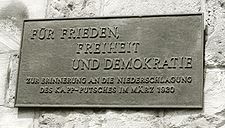
Wetter (Ruhr) station
Encyclopedia
Wetter station is in the district of Vorhalle in the centre of the city Wetter (Ruhr)
in the German state of North Rhine-Westphalia
. It is served by regional services and Rhine-Ruhr S-Bahn line S 5.
 The station is located on the Elberfeld–Dortmund line
The station is located on the Elberfeld–Dortmund line
and was opened on 9 March 1849 as a through station by the Bergisch-Märkische Railway Company. The original station building, which was built in 1850, was demolished by the Prussian state railways
and replaced by the existing building in 1905.
On 17 March 1920 there was fighting at the station during the Ruhr Uprising
, between units of the Ruhr Red Army
and a vanguard of the Freikorps Lichtschlag
, in response to the Kapp Putsch
. A plaque commemorates the events.
In 1994, line S 5 services of the Rhine-Ruhr S-Bahn began operating on the line through the station and regional service N 33 was discontinued.
Today the station building is no longer used by the railway. Instead the city library has been located here since 2007. A catering business has also occupied the building since the spring of 2008.
The station is also a bus junction and an important point of interchange between rail and urban transport. It is served by the express bus route SB38 and city bus lines 541, 553, 555, 585, 591, 592, 593 and 595, operated by Hagener Straßenbahn AG, Verkehrsgesellschaft Ennepe-Ruhr and Busverkehr Rheinland, at hourly intervals.
Wetter (Ruhr)
Wetter is a town in western Germany and belongs to the area of Ruhr area and the federal state of North Rhine-Westphalia. Wetter belongs to the district of Ennepe-Ruhr-Kreis. The river Ruhr flows through the urban area and separates the district of Altwetter from the districts of Esborn,...
in the German state of North Rhine-Westphalia
North Rhine-Westphalia
North Rhine-Westphalia is the most populous state of Germany, with four of the country's ten largest cities. The state was formed in 1946 as a merger of the northern Rhineland and Westphalia, both formerly part of Prussia. Its capital is Düsseldorf. The state is currently run by a coalition of the...
. It is served by regional services and Rhine-Ruhr S-Bahn line S 5.
History

Elberfeld–Dortmund railway
The Elberfeld–Dortmund railway is a major German railway. It is part of a major axis for long distance and regional rail services between Wuppertal and Cologne, and is served by Intercity Express, InterCity, Regional Express, Regionalbahn and S-Bahn trains....
and was opened on 9 March 1849 as a through station by the Bergisch-Märkische Railway Company. The original station building, which was built in 1850, was demolished by the Prussian state railways
Prussian state railways
The term Prussian state railways encompasses those railway organisations that were owned or managed by the State of Prussia...
and replaced by the existing building in 1905.
On 17 March 1920 there was fighting at the station during the Ruhr Uprising
Ruhr Uprising
The Ruhr uprising was a left-wing workers' revolt in the Ruhr in March 1920. The uprising took place initially on the occasion of the call for a general strike issued by the Social Democrat members of the German government in response to the Kapp Putsch of 13 March 1920:The first demonstrations...
, between units of the Ruhr Red Army
Ruhr Red Army
Red Ruhr Army was an army of between 50,000 and 80,000 left wing workers from the Communist Party of Germany, the Communist Workers' Party of Germany, the Independent Social Democratic Party of Germany, and the Free Workers Union of Germany, formed on March 13, 1920 as a reaction to the Kapp Putsch...
and a vanguard of the Freikorps Lichtschlag
Freikorps Lichtschlag
The Freikorps Lichtschlag was a paramilitary unit in Germany that was established on 14 December 1918 just after the end of World War I.After the German Revolution of 1918–1919, the corps command of the VII. Armeekorps based in Münster under General Oskar von Watter began to establish Freikorps...
, in response to the Kapp Putsch
Kapp Putsch
The Kapp Putsch — or more accurately the Kapp-Lüttwitz Putsch — was a 1920 coup attempt during the German Revolution of 1918–1919 aimed at overthrowing the Weimar Republic...
. A plaque commemorates the events.
In 1994, line S 5 services of the Rhine-Ruhr S-Bahn began operating on the line through the station and regional service N 33 was discontinued.
Today the station building is no longer used by the railway. Instead the city library has been located here since 2007. A catering business has also occupied the building since the spring of 2008.
Train services
Today the station is served by S 5 services operated by DB Regio NRW at 30 minute intervals. In addition, the station has an hourly service of the Ruhr-Lenne-Bahn (RB 40) operated by Abellio Rail NRW. The Ruhr-Sieg-Express (RE 16) service also stops at hourly intervals. This service was operated by DB Regio NRW until 8 December 2007 and has since been operated by Abellio Rail. The Wupper-Express and the long-distance passenger services pass through without stopping. Freight trains do not regularly operate through the station, because freight trains use the Ruhr Valley line on the other side of the Ruhr.The station is also a bus junction and an important point of interchange between rail and urban transport. It is served by the express bus route SB38 and city bus lines 541, 553, 555, 585, 591, 592, 593 and 595, operated by Hagener Straßenbahn AG, Verkehrsgesellschaft Ennepe-Ruhr and Busverkehr Rheinland, at hourly intervals.

